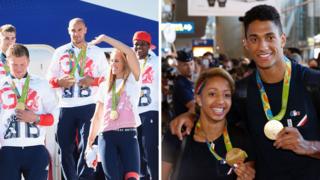 Image copyright
Image copyright
Getty Images/AFP
Back from Rio: Team GB came second in the medal table, the French (right) came seventh
The French are perfectly happy with their Rio Olympics tally. The haul of 42 medals, including 10 golds, was a post-war record, and their seventh overall placing was the same as at London 2012.
That is the official line.
In fact, there is an unacknowledged undercurrent of grumbling. It is a reaction born of envy, self-doubt – and historic rivalry with the island neighbour to the north.
For the French, doing satisfactorily at the Olympics is all very well. But being so roundly beaten by the Brits – that is another matter entirely.
As is often repeated, the two countries are broadly of the same size and wealth. They have sports budgets that are not dissimilar. In theory, they should do roughly as well as each other in the Games – and in the past they did.
But this year, the French looked on with a mix of admiration and brooding as Team GB leapt into a different league.
In pictures: Olympians return home
Team GB arrive back from Rio Olympics
Just how Great were Britain in Rio?
Money? Detail? How did Team GB do it?
British progress over the last five Olympics – from 37th to 2nd – has been constant and spectacular. The French, meanwhile, have been merely treading water.
Image copyright
Reuters
Pole vault silver medallist Renaud Lavillenie from France cried when the Rio crowd booed him
Image copyright
AP
France’s Teddy Riner (left) beat Japan’s Hisayoshi Harasawa to take gold in the +100kg judo
A whiff of the irritation felt in France comes in an article in Le Monde newspaper (in French), provocatively titled “How the British bought their medals”.
Atlanta disaster
The headline perfectly encapsulates a perennial French beef against the Brits: that their world is built around commercialism and a deeper understanding (certainly than the French have got) about the power of cash.
The article rehearses the well-known story of how the UK bounced back from its one and only gold medal at the Atlanta Olympics: with lottery money, the “No Compromise” culture at UK Sport, and the funding axe that fell on non-performers.
“Basketball, handball, volleyball, weightlifting: all discovered to their cost that the only thing that counts is results,” the article reads.
“Britain’s legendary fair play is a distant memory.”
The piece gets dangerously close to libellous, raising allegations over drug use (in running) and mechanical tinkering (cycling) – before conceding that UK Sport’s decision to focus exclusively on the Olympics (as opposed to lesser championships) has certainly borne fruit.
Other writers take a less chippy line, pondering what lessons France might learn from GB success.
There was a 4% increase in the French sports budget in 2016, to just under €500m (£429m).
By the time of London 2012, UK Sport’s spending on elite sports alone had risen to £264m, and last November the government gave UK Sport a 29% funding increase.
One problem is that the French could never do what the UK has done – and ruthlessly focus funding only where there is a chance of medals.
France abhors that kind of Darwinian weeding-out of the weakest. “We prefer the richness of the sports-for-all approach,” according to Sports Minister Thierry Braillard.
It means the French National Olympic and Sports Committee (CNOSF) will continue to fund some 90 separate federations – as opposed to the 20 selected by Sports UK.
Image copyright
AFP
The French medallists were welcomed home as heroes – but it rankles to be outshone by the Brits
But other UK ideas may well be considered at a special roundtable on sports, called by the minister for October. The French want a turnaround ahead of the 2024 Games, which they hope to get for Paris.
‘Moaning minnies’
TV reports before Rio showed how many French sportsmen and -women were living close to the breadline. They receive no money from the official federations, which pay sometimes scandalously high salaries to their own officials.
UK-style sponsorships, which allow athletes a living wage so they can focus on training, will be one possibility.
Another will be stricter financial control of the federations, some of which are seen as dangerously powerful and autonomous.
A third idea is advice that could be offered to France as a whole: stop thinking that the way you do things is necessarily the best.
As one commentator below the Le Monde article put it: “The British know how to change their behaviour in order to win. But then because they succeed, we find it suspect? We have become a nation of moaning minnies.”
Another Anglophile had this wistful explanation for the UK’s success: “Pragmatism; more pragmatism; and again… pragmatism.” By implication – it is time France had some.



